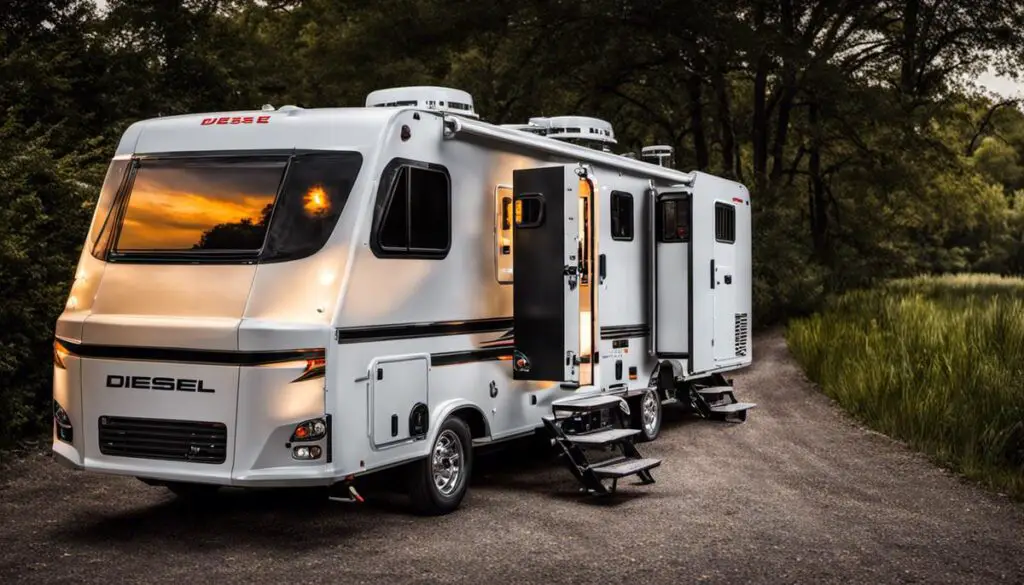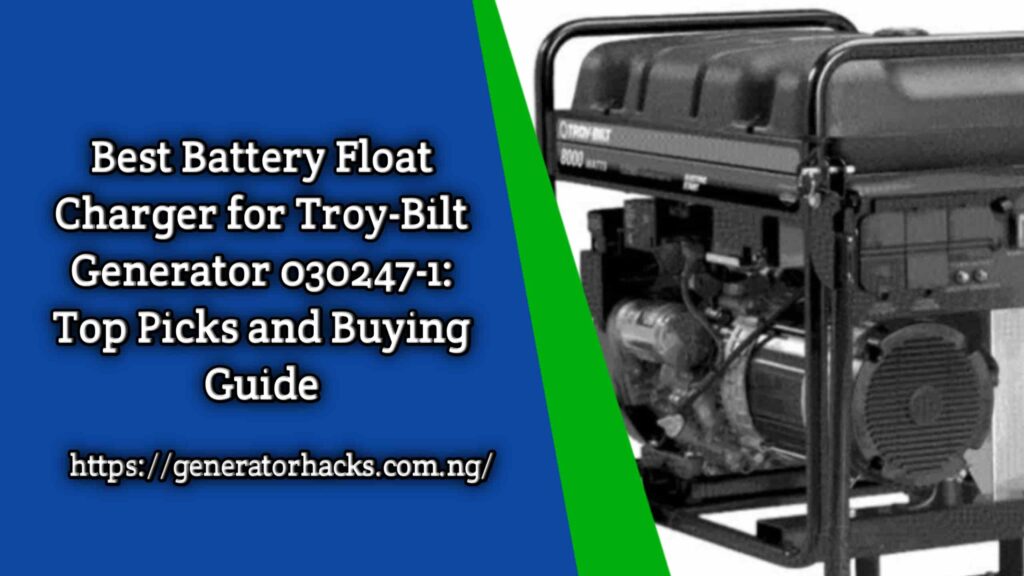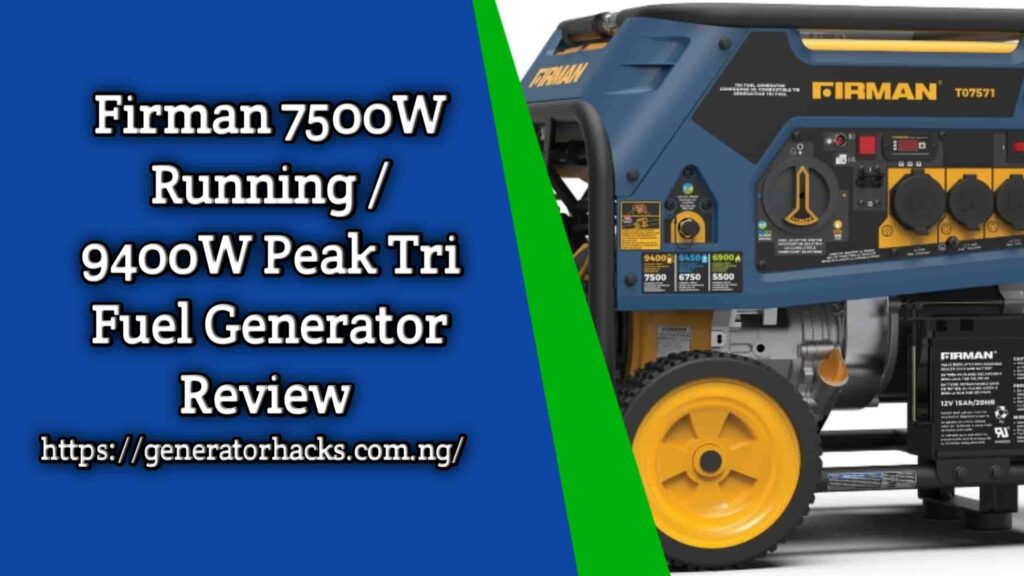As an Amazon Associate, we earn from qualifying purchases. This does not affect the price you pay or the quality of the products you buy. For more information, please read the full affiliate disclosure here.
Embarking on a thrilling RV adventure is as much about the journey as the destination. At the heart of a smooth trip lies a reliable and efficient RV generator, powering everything from your coffee maker to the air conditioner.
But with the multitude of options available in terms of types, fuels, and features, selecting the right RV generator can quickly become a daunting task.
In this blog post, we provide a comprehensive understanding of RV generators, helping you evaluate different fuel options based on your individual needs and preferences.
We’ll also guide you through various contributing factors and features to consider before solidifying your choice.
What Are RV Generators All About?
An RV generator is a crucial equipment for recreational vehicles, campers, and motorhomes. It generates electrical power that allows you to use amenities such as air conditioning, microwave, TV, and more while on the road, away from traditional power sources.
Depending on the type, RV generators can run on gasoline, propane, or diesel fuel. The three primary generator types available in the market are:
- Portable generators.
- Standby/Build-in generators.
- And inverter generators.
Each of these different types of generators has its benefits and drawbacks; for instance, while standby/build-in generators such as Onan RV generators are built into your RV and offer significant power, they are also more expensive and heavier to move around.
In contrast, portable generators like the Generac GP 6500 generator are less costly and more easily transported. They generally produce power that can power necessary RV appliances and can be noisier than inverter generators.
For portable generators, you can find them for around $600 upwards on Amazon and other online market stores. Unlike inverter generators, you can find them for about $700 to $6000.
One thing we love about generators with inverter technology for recreational vehicles is that they are not only quieter but also more fuel-efficient and produce cleaner energy – reducing the risk of damaging sensitive electronics like laptops or TVs.
Although they may cost more upfront, if you plan to use your RV a lot, the investment could be worth it in the long run.
IMPORTANT READ:- Best Generac Generator For RV – Buying Guide
What Are The Power Requirements For RV Generators to be Considered?

When selecting an RV generator, you must also consider the power requirements of the appliances in your RV after knowing the type of generator you need, whether it is an inverter generator, standby generator or portable generator.
The common high-wattage appliances mostly used on RVs include;
- Air conditioning units
- And microwaves.
while lower-wattage appliances might consist of;
- Lights.
- Chargers.
- Toasters.
And every appliance you will have on your RV has power consumption rated in watts. To determine the generator size you need, calculate the total wattage of all appliances that could run simultaneously.
For instance, if you have a microwave with a running watt of 800W and a starting watt of 1000W with a refrigerator with a running watt of 600W and a starting watt of 800W, when calculating your wattage, you will add it all together.
That’s to say, you will need a generator of around 3500 watts to run the refrigerator and microwave together.
IMPORTANT READ:- Best Generator for Coffee Trailer: Buyer’s Guide
Running Wattage and Starting Wattage
One key concept in understanding generator power requirements is ‘running wattage’ and ‘starting wattage.’
Running wattage, or rated or continuous wattage, is the power a generator can continuously output to keep your appliances running.
In contrast, starting wattage, or surge wattage, is a higher power level that some appliances need to start up.
For example, air conditioners, refrigerators, and other appliances with motors often need more power to start running than to keep running.
This extra power demand can last for a few seconds to a couple of minutes. When determining your power requirements for an RV generator, it is essential to consider both running and starting wattage.
Therefore, choosing the best RV generator requires a good understanding of your power needs, consideration of the generator type that suits your setup, and an understanding of concepts like running and starting wattage.
With this knowledge, you’ll better equip yourself for a comfortable, uninterrupted RV journey by calculating the necessary generator wattage.
IMPORTANT READ:- FAQs: What Will 8000 Watt Generator Run?
Evaluating Fuel Options For RV Generators
Apart from the running and starting watts, power equipment, choosing an RV generator lies also in evaluating the different fuel options available.
Currently, three predominant options exist:
- Diesel.
- Propane.
- And gasoline.
Your choice heavily depends on availability, cost, eco-friendliness, ease of use, and energy-generating wattage.
Diesel Generators
Diesel RV generators are often more fuel-efficient than their counterparts and can provide a higher wattage.
They tend to be reliable and require less maintenance due to the absence of an ignition system, which can spark and wear out over time.
However, they could be more expensive upfront, and diesel fuel isn’t always as readily available as gasoline.
While diesel combustion doesn’t produce carbon monoxide, it does produce a considerable amount of other greenhouse gasses, impacting its eco-friendliness.
Propane Generators
Propane generators stand as an eco-friendly and easily maintained option. The fuel, liquefied petroleum gas, is widely available and stores well, making it a viable choice for those planning long trips or infrequent use.
Unfortunately, propane generators generally deliver less power than diesel or gasoline generators.
They also suffer from reduced efficiency in cold weather. While cleaner burning than diesel or gasoline, propane poses potential safety hazards due to its highly explosive nature.
Gasoline Generators
Lastly, gasoline generators offer a high power output and relatively low initial cost. Gasoline is readily available almost everywhere, making it rather convenient.
However, they require more maintenance than diesel generators, and gasoline has a short shelf life.
These generators may be less eco-friendly due to increased emissions and reliance on fossil fuels, increasing their environmental impact.
Pro Tips: Deciding on the best fuel option directly impacts your RV experience. Please weigh in on the availability of the fuel type in the regions you intend to travel, judge the cost of the fuel and the generator itself, mull over the ease of use, and assess how green you want your RV traveling to be.
What Are The Functionality and Features Needed for RV Generators?
1. Noise Levels
When selecting an RV generator, the noise level is one of the key considerations to remember.
For many travelers, peace and tranquility underscore the camping experience, and a loud generator can quickly mar this calm.
Most generators have their noise level measured in decibels(dB). Lower dB indicates quieter operation.
If peaceful operation is a priority, consider inverter generators; they’re usually designed to run quietly.
Here’s a noise level decibel chart as provided by Electronic Hub. And as you can see, 85 dB downwards is risk-free with no hearing damage, unlike the remaining levels.
Most generators, especially inverter generators, have a noise level decibel of around 49 to 70 dB.
In that case, when choosing a generator, don’t forget to check the local noise regulations of the areas you plan to camp in; some sites require generators that function below certain noise levels, like 60 dB.
2. Weight, Size and Portability
Another significant aspect you’ll want to look at after the noise of the generator is the weight and size of the generator.
The last thing you want is a bulky generator that’s hard to move around, especially when you’re on the go.
Look for a generator that can fit into the available space in your RV without causing strain.
In addition, consider the generator’s portability, or if it has wheels, making it easier to maneuver when setting up.
3. Consider Runtime
The generator’s runtime—how long it can operate before needing refueling—is an important feature to consider as well.
Think about how often you plan to use your generator and the length of time you’ll need it to run.
A generator with a larger fuel tank can generally operate for a more extended period, such as 9 hours long, but for some of them, it will also be heavier to move around.
In that case, when you understand your power needs, it will help you find a balance between these two factors.
FURTHER READING:- FAQs: How Long do Generators Last?
4. Availability of Parts and Service
The availability of parts and services is another factor in your decision.
Should your generator need repairs or servicing, you’ll want to ensure that parts are readily available and a service center nearby.
Look for generators from reputable brands with a wide distribution of services and parts.
4. Reflecting on Travel Patterns and Preferences
When deciding on a generator, reflect on your typical travel patterns.
Think about whether most of your camping will occur in well-established campsites or more remote locations.
Your destination criteria will likely influence the type and quality of generator you need.
If you plan to camp in more remote locations, you might prefer a generator with a longer runtime and larger fuel capacity. At the same time, established campgrounds often provide electrical hookups, potentially negating the need for a high-capacity generator but necessitating a quieter one due to proximity to other campers.
5. Checking Reviews and Comparison Shopping
Once you’ve identified the important features, read reviews and compare different generator brands and models.
Doing this can provide real-world insight into how the generators perform and how well they hold up over time.
Be vigilant of any recurring negative aspects customers mention, and try to understand what common problems may arise with each model. That’s because all generators have these common problems such as spark plugs, battery drainage and so on.
When you take time to read reviews of others, you will be able to identify which generators are more prone to this problem, so you won’t end up dealing with them.
Apart from reading reviews, you can also look for RV generator comparison charts online to see how different models stack up against each other.
You can also read How Much Does a Kohler Generator Cost: Buyer’s Guide
Final Thought
Finding the optimal RV generator doesn’t have to be complicated. With a proper understanding of RV generators and a good sense of your own needs, you can navigate the market with confidence.
By considering the different fuel options available and their associated pros and cons, you can pinpoint a solution that is efficient, affordable, and environmentally friendly for you.
Further, keeping in mind crucial elements such as noise levels, weight, size, portability, runtime, and the availability of parts & services can help tailor your purchase to be a perfect fit for your travel and camping style.
Finally, consider genuine user reviews and comparisons while deciding upon a generator. This not only reflects on the product’s reliability and performance but also offers a more practical, consumer-based perspective.
Share


